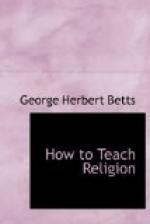KNOWLEDGE OF THE BIBLE
A knowledge of the essential parts of the Bible is indispensable to Christian culture. The Bible is the storehouse of spiritual wisdom of the ages, the matchless textbook of religion. Great men and women of all generations testify to its power as a source of inspiration and guidance. To be ignorant of its fundamental spiritual truths is to lack one of the chiefest instruments of religious growth and development. Not to know its teachings is to miss the strongest and best foundation that has ever been laid for fruitful and happy living. To lose a knowledge of the Bible out of our lives is to deprive ourselves of the ethical and religious help needed to redeem society and bring the individual to his rightful destiny. Yet this generation is confronted by a widespread and universal ignorance of the Bible, even among the adherents of the churches.
Making the Bible useful to the child. The child cannot be taught all of the Bible as a child. Indeed, parts of if dealing with the ideals and practices of peoples and times whose primitive standards were far below those of our own times are wholly unsuited to the mind of childhood, and should be left until maturity has given the mental perspective by which to interpret them. Other parts of the Bible prove dry and uninteresting to children, and are of no immediate spiritual significance to them. Still other parts, which later will be full of precious meaning, are beyond the grasp or need of the child in his early years and should be left for a later period. But with all these subtractions there still remains a rich storehouse of biblical material suited for all ages from earliest childhood to maturity. This material should be assembled and arranged in a children’s Bible. This abridged Bible should then be made a part of the mental and spiritual possession of every child.
The knowledge of the Bible which will be of most worth to the child must be a functioning knowledge; a knowledge that can and will be put at work in the child’s thought, helping him form his judgments of right and wrong and arrive at a true sense of moral values; a knowledge that stirs the soul’s response to the appeal God makes to the life; a knowledge that daily serves as a guide to action amid the perplexities and temptations that are met; a knowledge that lives and grows as the years pass by, constantly revealing deeper meanings and more significant truths.
The test of useful knowledge.—This is all to say that the knowledge of the Bible given the child must in no sense be a merely formal knowledge, a knowledge of so many curious or even interesting facts separated from their vital meaning and application. It must not consist of truths which for the most part do not influence thought and action. Not how many facts are lodged in the mind, nor how many have passed through the mind and been forgotten, but how many truths are daily being built into character—this measures the value of the knowledge we teach the child from the Bible.




